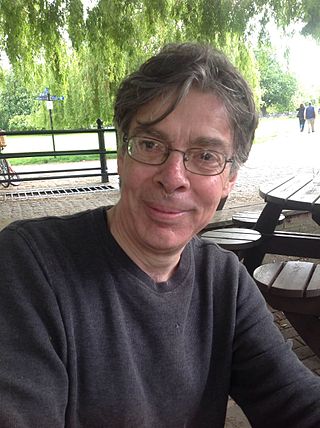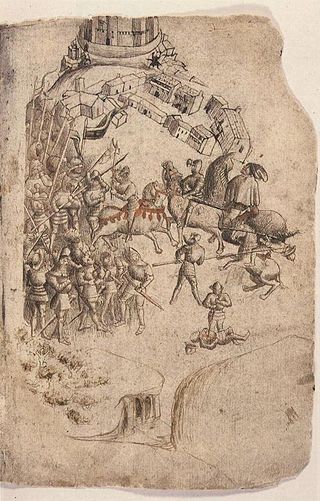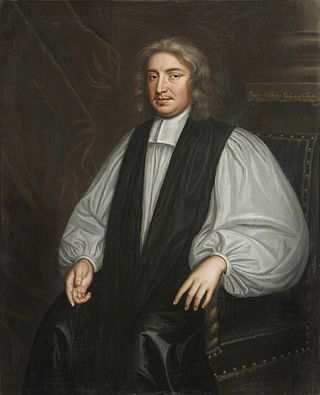
Edgar was King of England from 959 until his death in 975. He was the younger son of King Edmund I and his first wife Ælfgifu. Edmund was killed in 946 trying to protect his seneschal from attack by an outlaw, and because his children were infants he was succeeded by his younger brother Eadred, who ruled until his death in 955. Edgar's older brother, Eadwig, then became king and in 957 the kingdom was divided, Eadwig ruling south of the Thames and Edgar north of it. Historians disagree whether this was the result of a revolt by Edgar's supporters against Eadwig's incompetent rule or had been previously agreed. Edgar became king of all England on his brother's death in 959. A detailed account of Edgar's reign is not possible, because only a few events were recorded by chroniclers and monastic writers were more interested in recording the activities of the leaders of the church.

Robert Boyle was an Anglo-Irish natural philosopher, chemist, physicist, alchemist and inventor. Boyle is largely regarded today as the first modern chemist, and therefore one of the founders of modern chemistry, and one of the pioneers of modern experimental scientific method. He is best known for Boyle's law, which describes the inversely proportional relationship between the absolute pressure and volume of a gas, if the temperature is kept constant within a closed system. Among his works, The Sceptical Chymist is seen as a cornerstone book in the field of chemistry. He was a devout and pious Anglican and is noted for his writings in theology.

William de St-Calais was a medieval Norman monk, abbot of the abbey of Saint-Vincent in Le Mans in Maine, who was nominated by King William I of England as Bishop of Durham in 1080. During his term as bishop, St-Calais replaced the canons of his cathedral chapter with monks, and began the construction of Durham Cathedral. In addition to his ecclesiastical duties, he served as a commissioner for the Domesday Book of 1086. He was also a councillor and advisor to both King William I and his son, King William II, known as William Rufus. Following William Rufus' accession to the throne in 1087, St-Calais is considered by scholars to have been the new king's chief advisor.

Anglo-Saxon runes are runes used by the early Anglo-Saxons as an alphabet in their writing system. The characters are known collectively as the futhorc from the Old English sound values of the first six runes. The futhorc was a development from the 24-character Elder Futhark. Since the futhorc runes are thought to have first been used in Frisia before the Anglo-Saxon settlement of Britain, they have also been called Anglo-Frisian runes. They were likely to have been used from the 5th century onward, recording Old English and Old Frisian.

Simon J. Schaffer is a professor of the history and philosophy of science at the Department of History and Philosophy of Science at the University of Cambridge and was editor of The British Journal for the History of Science from 2004 to 2009.

Steven Shapin is an American historian and sociologist of science. He is the Franklin L. Ford Research Professor of the History of Science at Harvard University. He is considered one of the earliest scholars on the sociology of scientific knowledge, and is credited with creating new approaches. He has won many awards, including the 2014 George Sarton Medal of the History of Science Society for career contributions to the field.

Felix of Burgundy, also known as Felix of Dunwich, was a saint and the first bishop of the kingdom of the East Angles. He is widely credited as the man who introduced Christianity to the kingdom. Almost all that is known about him comes from The Ecclesiastical History of the English People, completed by the English historian Bede in about 731, and the Anglo-Saxon Chronicle. Bede wrote that Felix freed "the whole of this kingdom from long-standing evil and unhappiness".

The Christian Virtuoso (1690) was one of the last books published by Robert Boyle, who was a champion of his Anglican faith. This book summarised his religious views including his idea of a clock-work universe created by God. Boyle was a devout Anglican, and with the rise of science and reason during his lifetime, was troubled by increasing atheism. This spurred him to write about his belief of science and religion supporting each other.
Anne Elizabeth Curry is an English historian and Officer of Arms.
The Hartlib Circle was the correspondence network set up in Western and Central Europe by Samuel Hartlib, an intelligencer based in London, and his associates, in the period 1630 to 1660. Hartlib worked closely with John Dury, an itinerant figure who worked to bring Protestants together.
Patrick "Pat" Collinson, was an English historian, known as a writer on the Elizabethan era, particularly Elizabethan Puritanism. He was emeritus Regius Professor of Modern History, University of Cambridge, having occupied the chair from 1988 to 1996. He once described himself as "an early modernist with a prime interest in the history of England in the sixteenth and seventeenth centuries."

Warfare in Medieval Scotland includes all military activity in the modern borders of Scotland, or by forces originating in the region, between the departure of the Romans in the fifth century and the adoption of the innovations of the Renaissance in the early sixteenth century. In this period conflict developed from minor raids to major conflicts, incorporating many of the innovations of continental warfare.
William de Chesney was a medieval Anglo-Norman nobleman and sheriff. The son of a landholder in Norfolk, William inherited after the death of his two elder brothers. He was the founder of Sibton Abbey, as well as a benefactor of other monasteries in England. In 1157, Chesney acquired the honour of Blythburgh, and was sheriff of Norfolk and Suffolk during the 1150s and 1160s. On Chesney's death in 1174, he left three unmarried daughters as his heirs.

The Oxford Philosophical Club refers to a group of natural philosophers, mathematicians, physicians, virtuosi and dilettanti gathering around John Wilkins FRS (1614–1672) at Oxford in the period 1649 to 1660. It is documented in particular by John Aubrey: he refers to it as an "experimental philosophical club" run weekly by Wilkins, who successfully bridged the political divide of the times. There is surviving evidence that the Club was formally constituted, and undertook some projects in Oxford libraries. Its historical importance is that members formed one of the major groups that came together in the early 1660s to form the Royal Society of London.

Louis Gayant was a French surgeon and anatomist. He was one of the founding members of the French Academy of Sciences.
Joshua Childrey (1623–1670) was an English churchman and academic, antiquary and astrologer, the archdeacon of Salisbury from 1664. He was a "country virtuoso", and an avowed Baconian. He also has been considered a dilettante.
The Roy G. Neville Prize in Bibliography or Biography is a biennial award given by the Science History Institute to recognize a biographical work in the field of chemistry or molecular science. The Roy G. Neville Prize was established in 2006 and named to honor scientist and book collector Roy G. Neville. Neville founded Engineering and Technical Consultants, Redwood City, California, in 1973. He also assembled one of the world's largest collections of rare books in the field of science and technology. The Neville collection, including over 6,000 titles from the late 15th century to the early 20th century, was acquired by the Chemical Heritage Foundation in 2004.
Alan de Neville was an English nobleman and administrator who held the office of chief forester under King Henry II of England. Before serving the king, Neville was an official of Waleran, Count of Meulan. In 1166, Neville was named chief forester, an office he held until his death. Besides his forest duties, Neville also supported the king during the Becket controversy, and was excommunicated twice by Thomas Becket, the Archbishop of Canterbury. Neville was known for the harshness he displayed in carrying out his forest office, and at least one monastic chronicle claimed that he "most evilly vexed the various provinces throughout England".
Vivien Anne Law, Lady Shackleton, was a British linguist and academic, who specialised in grammar. Over her lifetime, she "acquired a grammatical knowledge of over a hundred languages". She spent all her academic career at the University of Cambridge.
Nigel Fossard was an Anglo-Norman nobleman who held the honour of Mulgrave in Yorkshire and by virtue of that is considered the feudal baron of Mulgrave.











